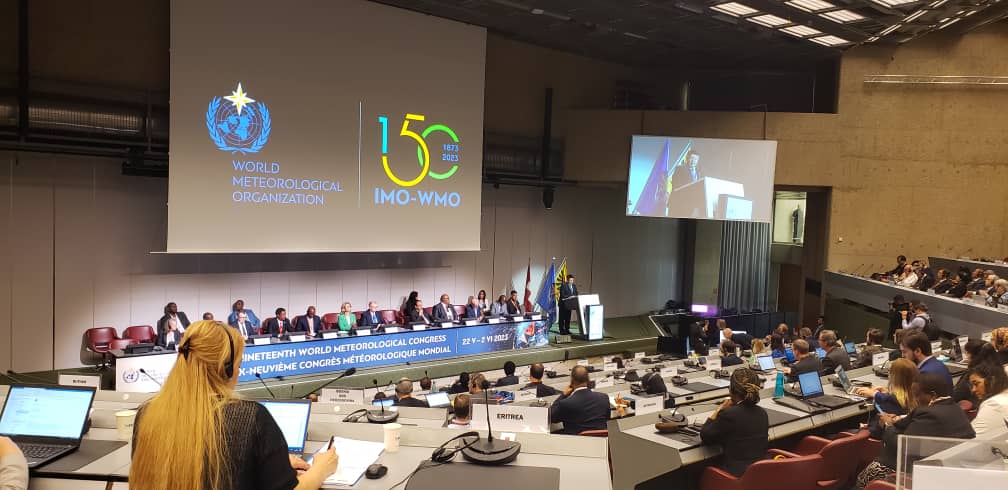[ad_1]

Ghanaian authorities say they have made a solid case to be considered for the Systematic Observation Financing Facilities (SOFF) at the ongoing World Meteorological Organisation (WMO) in Geneva.
SOFF is a global program that aims to address a chronic problem in a global and systematic way: missing surface-based weather and climate observations from Least Developed Countries (LDC) and Small Islands Developing States (SIDS).
The program focuses solely on the first stage of the meteorological value chain, which lays the groundwork for effective policy and investment decisions at the local level.
SOFF helps countries with financial and technical assistance to strengthen their hydromet network, data collection, processing, and exchange.
The Global Basic Observation Network (GBON) is a globally agreed-upon global design and associated metrics. The Global Body of Knowledge (GBON) clearly specifies countries’ international data exchange commitments for the most critical surface-based weather and climate data.
The SOFF investments will be governed by GBON indicators. SOFF offers resources for beneficiary nations to close the GBON deficit. In other words, GBON criteria ensure the proper level of investment, while SOFF provides these investments through an integrated and cohesive intervention.
The major goals would be improved weather and climate prediction tools, as well as continuous compliance with the GBON by participating LDCs and SIDS.
The SOFF initiative will greatly increase the number of people who can take advantage of existing or improved weather and climate services. This will help to achieve the aim of stronger climate adaption and resilient development by improving weather predictions, early warning systems, and climate information services, which are critical for saving lives and livelihoods and protecting property.
It will help to provide key observation for adaptation and resilience planning.
Weather and climate prediction tools are critical for countries to design and implement meaningful adaptation and resilient development programs.
SOFF’s initial five-year implementation term intends to assist 68 SIDS and LDCs in achieving and maintaining GBON compliance.
This will result in a 10-fold increase in observational data from radiosonde observations and a 20-fold increase in data from weather stations, which will be shared globally.
USD 400 million is required to cover the first five years of SOFF operation in order to assist all SIDS and LDCs in reaching GBON compliance.
SOFF assistance will be provided in three stages. During the Readiness phase, the country’s hydromet status will be examined, the GBON gap will be established, and a plan to close the gap will be developed.
Countries can close the GBON investment and capacity gap during the Investment phase. The Compliance phase promotes long-term GBON compliance by providing access to updated weather predictions and climate analysis products.
SOFF will establish a new, organized, and results-oriented relationship among recipient countries, bilateral and multilateral SOFF financing partners, potential private sector contributors, and SOFF operational partners.
However, lower middle-income countries such as Ghana are not eligible for the facility.
In a zoom interview, Eric Assumah, Acting Director-General of Ghana Meteorological Agency (GMet), told JoyNews’ Mahmud Mohammed-Nurudeen that Ghana has made a strong intervention since meteorological data is the core of meteorologists work to be able to do the analysis.
He said the country needs expensive equipment to be able to do work and therefore the SOFF is important.
“Every hour this data must be collected and transmitted to our servers – quality control and archive and use this information to be able to do the forecast.”
Equipment such as automatic stations that collect data and transmit it to a server for forecasting purposes. Radars are also a primary goal for the country in order to have a better picture of the atmosphere and analyze conditions and forecasts.
“We are working to make sure to amend the decision to capture us,” Mr. Assumah said.
According to him, the Minister of Communication and Digitalization, Ursula Owusu, met with the Secretary General of the World Meteorological Organization, Prof. Petteri Taalas, to have discussion and make a strong case for Ghana.
“If even the SOFF would not – the criteria will not allow countries like Ghana to benefit, the secretary general should find another mechanism to support other countries who fall within the SOFF bracket so that all can get the necessary funding and support to be able to provide the data so much needed to run the models,” he said.
Mr. Assumah also stated that the African Meteorological Group had already met in Ethiopia and stated that the issue is about the continent’s lack of data to enter into the global system, and thus WMO should focus on all nations to fix the data problem rather than using economic indicators to disqualify some countries.
Other interventions made by Ghana so far include the necessity for less developed meteorological institutions to engage with developed institutions and form bilateral partnerships with them in order to strengthen their capacities.
“Ghana has started something with Denmark Meteorological Institute. We have actually signed a strategic sector cooperation agreement with Danish Government.”
He proposed to the World Meteorological Organization that similar things be done in other countries to increase the capacity of their workforce.
DISCLAIMER: The Views, Comments, Opinions, Contributions and Statements made by Readers and Contributors on this platform do not necessarily represent the views or policy of Multimedia Group Limited.
[ad_2]
Source link